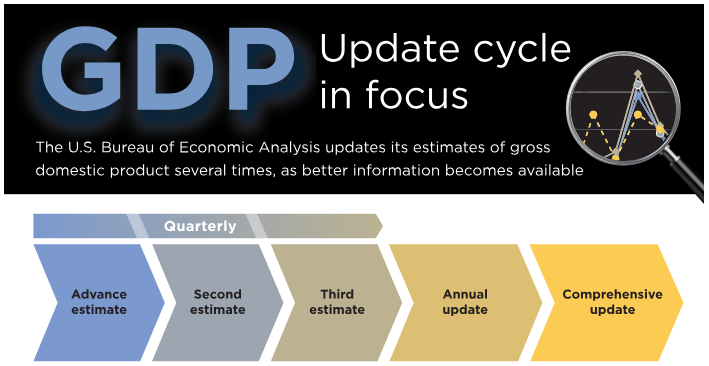Bureau of Economic Analysis
Annual Update of GDP, Industry, and State Statistics Starts Sept. 25
Release of the annual update of gross domestic product and related statistics, including GDP by industry, begins Sept. 25. Updates of state and county statistics start Sept. 26.
Regular annual updates enable the U.S. Bureau of Economic Analysis to refine our estimates as more complete source data become available. They are also a time to bring in improvements in methodology and presentation. This year, we'll introduce data on business investment in data centers.
Principal Federal Economic Indicators
Noteworthy
The Latest
Personal Income Increases in June
Personal income increased 0.3 percent in June after increasing 0.4 percent in May. Wages and salaries, the largest component of personal income, increased 0.5 percent in June after increasing 0.3 percent in May.
Current-dollar disposable personal income (DPI), after-tax income, increased 0.3 percent in June, the same increase as in May.
Real DPI, income adjusted for taxes and inflation, fell 0.1 percent in June after…
New Detail Available on Direct Investment for 2009–2012
Interested in learning about foreign direct investment in the U.S. advertising industry? Or in U.S. direct investment in Vietnam? The U.S. Bureau of Economic Analysis (BEA) released its most detailed statistics on U.S.
Gross Domestic Product, 2nd quarter 2013 (advance estimate); Comprehensive Revision: 1929 through 1st quarter 2013
Real gross domestic product -- the output of goods and services produced by labor and property located in the United States -- increased at an annual rate of 1.7 percent in the second quarter of 2013 (that is, from the first quarter to the second quarter), according to the "advance" estimate released by the Bureau of Economic Analysis.
GDP Growth Accelerates in Second Quarter
Real gross domestic product (GDP) increased 1.7 percent in the second quarter of 2013 after increasing 1.1 percent in the first quarter, according to the “advance” estimate released today by the Bureau of Economic Analysis (BEA).
GDP highlights The second-quarter acceleration in GDP reflected the following:
Changes to How the U.S. Economy is Measured Roll Out July 31
A pharmaceutical company develops a new cancer drug. A Hollywood studio creates a box-office blockbuster. A song writer records a new hit. On July 31, BEA will begin including the amount of money businesses invest in the production of such intellectual property as part of gross domestic product (GDP).
Why?
Comprehensive Revisions to NIPA: Reconsidering Treatment of R&D and Entertainment
The Bureau of Economic Analysis (BEA) will release its comprehensive revision of the National Income and Product Accounts (NIPAs) next week. Among other important changes to estimates will be how the statistical agency treats research and development (R&D) and calculates entertainment in measuring gross domestic product (GDP). The revision generally occurs every 5 years.
Want to Learn More About U.S. Trade Statistics? Check out BEA's and Census' July 25 Webinar
Do you want to have a deeper understanding of how monthly trade statistics are compiled and how trade between the United States and other countries is measured? Then join the U.S. Bureau of Economic Analysis (BEA) and the U.S. Census Bureau for a July 25 webinar deciphering the U.S. international trade in goods and services report. The webinar will start at 1 p.m. EDT.
Want to Build Apps Using BEA Economic Data? BEA Launches API
Developers, are you looking for a way to bring some of the most closely watched economic data into your next app? You can now build apps using BEA economic statistics, thanks to BEA’s new application programming interface (API). The API provides direct access to gross domestic product (GDP) and related national economic statistics, along with regional economic statistics.
Revising Economic Indicators: Here's Why the Numbers Can Change
Once every 5 years, the U.S. Bureau of Economic Analysis produces a “comprehensive” revision to its gross domestic product (GDP) statistics, incorporating changes to how the U.S. economy is measured as well as more complete source data all the way back to 1929. This year is one of those years. In just a few weeks—on July 31 to be exact–updated GDP numbers will be released.
New data, new methodologies, changes in definitions and…




